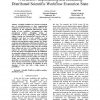875 search results - page 1 / 175 » Representing distributed systems using the Open Provenance M... |
FGCS
2011
12 years 11 months ago
2011
From the World Wide Web to supply chains and scientific simulations, distributed systems are a widely used and important approach to building computational systems. Tracking prov...
FGCS
2011
12 years 11 months ago
2011
A description of a data item’s provenance can be provided in different forms, and which form is best depends on the intended use of that description. Because of this, differen...
FAST
2009
13 years 2 months ago
2009
We present a formalism for provenance in distributed systems based on the -calculus. Its main feature is that all data products are annotated with metadata representing their prov...
ATAL
2007
Springer
13 years 10 months ago
2007
Springer
Determining the provenance of data, i.e. the process that led to that data, is vital in many disciplines. For example, in science, the process that produced a given result must be...
CCGRID
2010
IEEE
12 years 8 months ago
2010
IEEE
- Scientific workflows have become an integral part of cyberinfrastructure as their computational complexity and data sizes have grown. However, the complexity of the distributed i...

